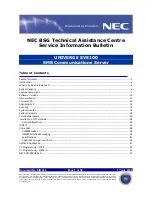
Configuration
25
1. Transmit Timer
If set to “Transmit Timer mode”, this is the time period for
which data will be stored in the buffer before being sent. It is a
free running clock. Upon every “tic” of the clock, if there is
data in the buffer, a packet is sent out the ethernet port.
If set to “Idle Timeout mode”, this is an idle timer. Any data in
the buffer is sent out the ethernet port after the EtherPoll detects
this length of time with no incoming data on the RS-232 port.
Allowable values range from 1msec to 10,000msec (10
seconds) for both timers. Only one is used at a time. Default
value is 20 msec.
M. Timer Mode
When set = 0, the transmit timer is used. If set = 1, the idle
timeout mode is used.
2. Block Size
The maximum ethernet packet buffer size. The minimum value
is 1 byte, the maximum 4096 bytes (4 K). Note that a minimum
ethernet packet is 64 bytes, so extremely small values may be
inefficient. The timer (above) usually overrides this value.
When “block size” characters are in the buffer, a packet is sent
out the ethernet port even if timer criteria has not been met, so
the block size should be large enough to prevent fragmentation
if data blocks should not be fragmented.
3. Flow Control OFF Buffer Level
If the amount of data stored in the buffer reaches this point, and
the EtherPoll is unable to transmit the data, then no further
input will be accepted (the port will flow off).
Under normal operation, this will not happen.
Summary of Contents for EtherPoll
Page 1: ...Revised October 7 2002 Firmware Version 4 1 EtherPoll User s Guide...
Page 2: ......
Page 4: ......
Page 8: ......
Page 56: ...48...















































